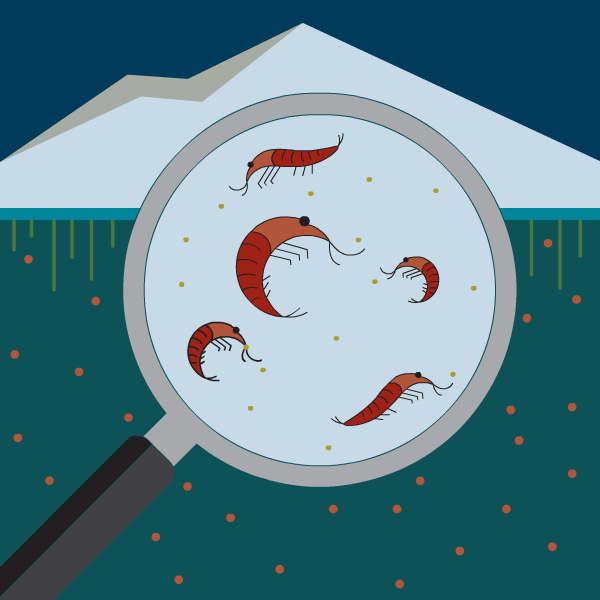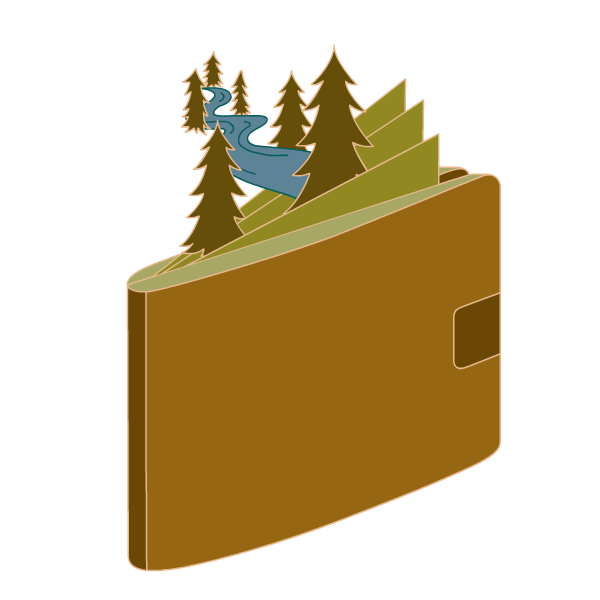Outstanding in their fields. Distinguished at Oregon State.

°ÄĂŹܼŇĆĹ×ĘÁĎ´óČ« has named Michael Freitag, Kathryn Higley and Brent Steel as its , the highest academic honor the university can bestow on a faculty member.
Freitag is an expert in fungal biology and genome structure. Higley is internationally recognized for her research on the health effects of radiation. Steel is a scholar of environmental policy, science policy and state politics.
Since 1988, Oregon State has awarded the title of University Distinguished Professor to faculty who have achieved national and international distinction for their contributions in scholarship, research and creative work, teaching and mentoring, public engagement and service.
Distinguished Professor Lectures — Friday May 20
, and will present lectures on Friday, May 20 in the Memorial Union Horizon Room, starting at 9 a.m., followed by receptions for each. Advanced registration and in-person attendance are encouraged, and all lectures will be recorded and .
Michael Freitag
Distinguished Professor of Biochemistry and Biophysics
College of Science
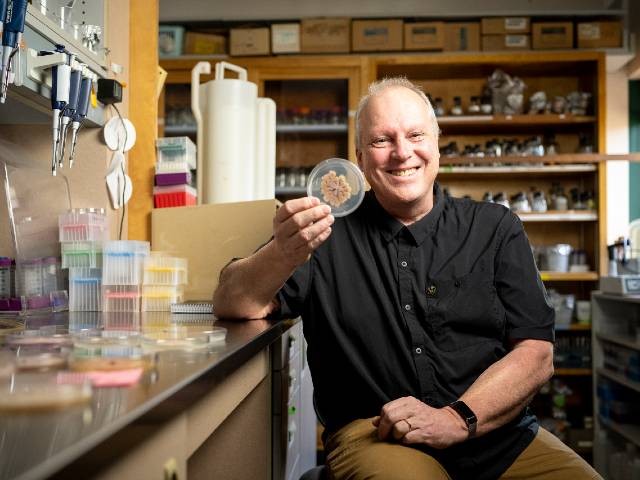
What originally drew you to your field of study?
I have had several fields to cultivate. I like fungi — they are a varied group of organisms, and even though they look very similar at first glance, they are quite the variable bunch. Fungi are easy to work with, cheap to maintain and are quite closely related to animals — much more so than to plants. They are perfect models for many basic problems in biology that have not been solved; for example, how the “genotype” determines the “phenotype” of an organism.
What keeps you motivated at this stage in your career?
Hands-on, in-the-lab training of undergraduate students in organized courses or in our lab. It’s the most rewarding part of the existence of a professor at an American university. Most students here don’t realize how much access to faculty they have compared to students in other countries.
What’s the one big takeaway you’d want someone to know about your field of study?
The word “epigenetics” is no longer useful. Sometimes a hypothesis comes along that generates useful models, but new data necessitate change; this has been the case with most phenomena that were called “epigenetic” in the 1980s. They are all long-term gene regulation, but calling a non-Mendelian trait “epigenetic” moved the field forward. Now it’s time to discard the hypothesis, and “epigenetic” should return to its original meaning, “development,” or any control of the expression of the genotype that is not precisely determined by the DNA sequence.
What have you learned from your work that surprised you?
Cycles and networks are the norm, while hierarchical “pathways” shown in textbooks rarely exist in nature. This relates to our soon-to-be-defunct society as a whole: If we are unable to generate cyclic networks that are nearly closed systems, we will make the planet inhospitable for our species (and much of the remaining “super charismatic megafauna”). Fungi and bacteria will be happy — more room for them.
What does the title Distinguished Professor mean to you?
People can distinguish me from others because I always wear shorts.
If you could name one person who inspires you, who would it be?
Mark Twain.
Questions just for fun:
When did you arrive at Oregon State? From where?
I came in 1987, originally from Germany, via a year abroad working and traveling in Australia and New Zealand and then New England.
What’s your favorite spot on campus?
My lab bench in 2035 ALS. You can tell it from the others by how much stuff is on it.
What’s your typical coffee order?
40 molar Americano.
What do you like to do when you’re not teaching or researching?
Biking, hiking, spinning, knitting, weaving, reading. When having a chance, visiting and entertaining my granddaughter.
What is your favorite part of Oregon to explore? Why?
The coast south of Coos Bay. Never found a better place on Earth yet.
If you hadn’t gone into academia, what do you think you would have done instead?
I would be running a bicycle repair shop.
Kathryn Higley
Distinguished Professor of Nuclear Science and Engineering
College of Engineering
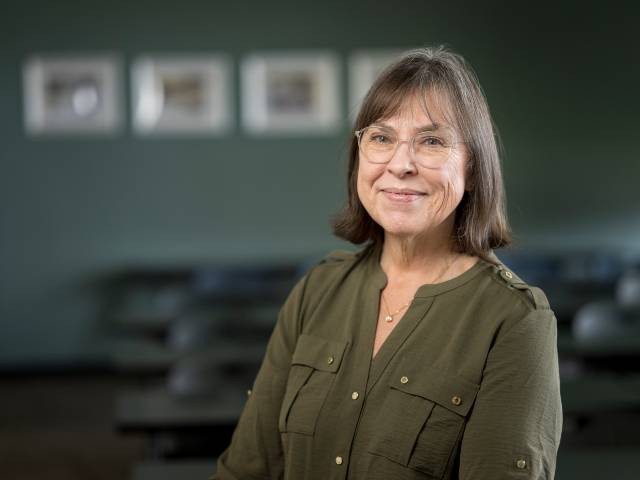
What originally drew you to your field of study?
A little bit of luck. It was my freshman year at Reed College. I was presented with a choice between learning to fly a plane or running a nuclear reactor. I chose the latter, because I was a poor college student, and reactor lessons didn’t cost me any money. That decision set me on the path to where I am today.
What keeps you motivated at this stage in your career?
Learning new things. The interdisciplinary nature of my field, the ability to work with great colleagues. The enthusiasm and curiosity of my students. My self-confidence in my technical knowledge of the field, which helps me communicate about it. Feeling like I’m making a small difference. All of these make my job incredibly rewarding.
What’s the one big takeaway you’d want someone to know about your field of study?
Radioecology is a subspecialty in an already extremely specialized field. But what we do makes a difference, and we’ve helped move the conversation about radiation protection to make it more broadly defined in science and regulations. Beyond simply protecting people — we’re really digging into the topic of protecting the environment from ionizing radiation. It’s nuanced. It’s challenging. And it’s fun.
What have you learned from your work that surprised you?
The application of allometric (scaling) principles to biological systems. These mathematical relationships can help fill in some data gaps in our knowledge, where we don’t have the time (or dollars) to do all the research. The same types of equations that can be used to predict behavior in nuclear systems can work in biological ones.
What does the title Distinguished Professor mean to you?
Honestly, it is incredibly humbling to be awarded this title. It means that the university finds value in what I’ve done over the years.
If you could name one person who inspires you, who would it be?
I think a lot about my mom. She’s been gone nearly 30 years, but I think about her quite a bit. She was incredibly well-read. A fantastic cook (I remember meals she made for six over a two-burner cook stove on camping trips). Musical. Artistic. Thoughtful. And in a time when women were discouraged from many pursuits, she wielded power tools like nobody’s business. She and my dad supported and encouraged me to pursue my education.
Questions just for fun:
When did you arrive at Oregon State? From where?
I arrived at OSU in the fall of 1994. I had graduated from Colorado State University with my doctorate. I had planned to return to Pacific Northwest National Laboratory as a senior research scientist, but this job opening came up at °ÄĂŹܼŇĆĹ×ĘÁĎ´óČ«. ...
What’s your favorite spot on campus?
On the quad in front of the MU. I love the architecture and the large trees.
What’s your typical coffee order?
Latte. I’m a bit of a coffee snob.
What do you like to do when you’re not teaching or researching?
I like being outside. In my garden, or somewhere in a natural setting — the mountains, the beach, the desert.
What is your favorite part of Oregon to explore? Why?
Just about any place in Eastern Oregon. I’m particularly fond of the area around the Steens Mountain Range. I love the open sky. But I also love the Oregon Coast. And the Cascades. So I would say I love exploring Oregon.
If you hadn’t gone into academia, what do you think you would have done instead?
I would have stayed with Pacific Northwest National Laboratory. Research has always been of interest to me, and they’ve had a strong track record in radiation protection-related research. It’s a very “academic-adjacent” kind of place.
Brent Steel
Distinguished Professor of Public Policy
College of Liberal Arts
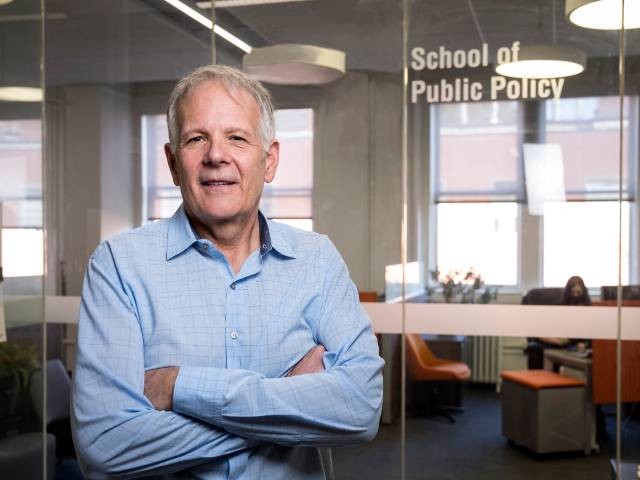
What originally drew you to your field of study?
I spent a lot of time with my (maternal) great-grandma and grandparents growing up, and they would tell stories about World War II and the Great Depression, and how President Roosevelt launched the New Deal to help “common ordinary people” like themselves. This piqued my interest in politics and the possibility that government can be used to help people.
What keeps you motivated at this stage in your career?
Working with and mentoring undergraduate and graduate students in our School of Public Policy and from across campus, including students from eight of OSU’s colleges. I get to learn something new literally every week!
What’s the one big takeaway you’d want someone to know about your field of study?
Public policy was originally a subfield in political science, but it is rapidly developing into an interdisciplinary endeavor with other social sciences such as economics and sociology. Public policy intersects with almost all disciplines in the academy, as there are policy implications of the research conducted in all of OSU’s 11 colleges, whether it be distributive, redistributive or regulatory policy.
What have you learned from your work that surprised you?
I did not anticipate the polarized and divisive level of politics that we are currently experiencing in the U.S. with the rise of disinformation, conspiracy theories and general contempt for people different from ourselves. Most of my research over the years has focused on the possibility of more democratic policy processes and the ability of people to make reasoned decisions concerning their country, communities, families and themselves. Earlier in my career, I thought we would be in a much different place than where we currently are.
What does the title Distinguished Professor mean to you?
It means I have had A LOT of help from others who I have worked with. From my mentors from graduate school that I continue to work with, to my many research collaborators from across campus and other universities, from my students, from the community, from my OSU faculty colleagues and from my spouse and son, I have been blessed with so much support.
If you could name one person who inspires you, who would it be?
I’ll modify my response to “persons” here. Ultimately, I wouldn’t be where I am today without the unconditional love and support from my late grandparents (Pearl and Arnold Shaffer) and family (Becky and Ryan). In addition, my major graduate school mentor, Dr. Nicholas P. Lovrich, was instrumental in getting me through school and on the professional path that life has taken me.
Questions just for fun:
When did you arrive at Oregon State? From where?
I was a trailing spouse when I first arrived at OSU in the early 1990s when my spouse took a faculty position in Sociology. I subsequently moved to Washington State University from 1992 to 1998, and then was hired by OSU in 1998 as an Associate Professor in Political Science with support from Provost Roy Arnold and College of Liberal Arts Dean Kay Schaeffer.
What’s your favorite spot on campus?
I have worked a lot with faculty and researchers in the College of Forestry and have spent much time with them across the street from Peavy Hall in the West Hall coffee shop. If we consider the McDonald and Dunn Research Forests part of campus, I live a couple of blocks away and am a frequent hiker in the forest with my dog.
What’s your typical coffee order?
Light, medium and dark roast — all coffee is good!
What do you like to do when you’re not teaching or researching?
I like all outdoor activities — downhill skiing, diving in tropical places (not the Oregon Coast!), fly-fishing and hiking. I also like attending baseball games and international travel.
What is your favorite part of Oregon to explore? Why?
Oregon is such a beautiful and geographically diverse state that picking just one favorite part is tough, but I would have to say an old-growth forest might be my favorite.
If you hadn’t gone into academia, what do you think you would have done instead?
Well, in high school most of my friends’ dads worked at the Kaiser Aluminum plant in Spokane, Washington, where I grew up. Their dads all got them jobs at the plant after high school for very high hourly wages at the time, which looked attractive to me. However, I didn’t have a connection to the plant, so I ended up working in various jobs and taking classes at the local community college with support from a Basic Education Opportunity Grant. My very positive experience at the community college ultimately led to an A.A. degree, then a B.A. and then graduate school. Who knows how I would have ended up in a different situation!
